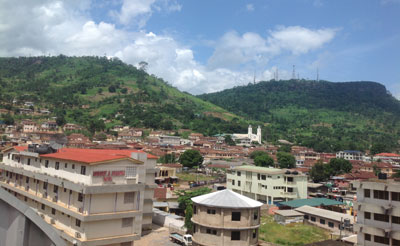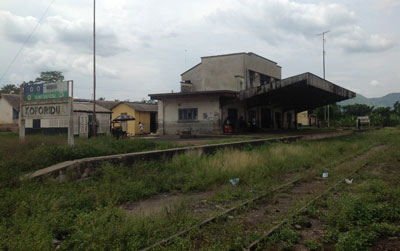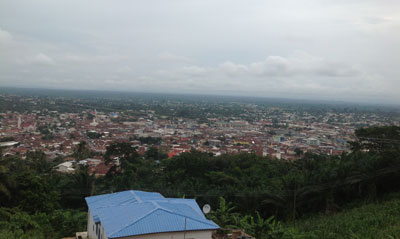Koforidua: Historically clean and serene commercial capital
 Koforudua is famous for its small, calm and serene environment; unique features other regional capitals in the country may envy.
Koforudua is famous for its small, calm and serene environment; unique features other regional capitals in the country may envy.
Advertisement
With a projected 87,215 heterogeneous population, Koforidua is the capital of the Eastern Region, as well as the New Juaben Municipality.
It is also the traditional capital of the New Juaben traditional area presided over by Daasebre (Prof. Emeritus) who Oti Boateng who is also the Omanhene.
The town is endowed with what many believe to be a pleasant climate, quality air, less crime rate, traffic and good access roads that reduce stress and anxiety.
Sandwiched between Accra and Kumasi, the town’s lush vegetation and clean environment are additional features that do not escape the appreciation of its inhabitants and visitors.
“Koforidua’s calm and small nature alone has endeared it to people who cherish stress-free environment”, says Mrs Linda Boateng, Managing Director of the Linda Dor Restaurants.
The entrepreneur thinks the unique features of the town have made it a highly preferred destination in recent years for major national conferences and social events, thanks to the multiple-rated hotels, restaurants and pubs.
The presence of first-class hotels such as the Capital View Hotel and MacDic Royal Plaza Hotel, restaurants such as the Linda Dor Restaurants and banks such as the Ghana Commercial Bank, Barclays Bank, Merchant Bank, Fidelity Bank, HFC, uniBank and rural banks have all raised the image of area in the past few years.
“Today, one does not have to travel to Accra or Kumasi to transact business”, says Samuel Addo, a public servant .
Koforidua has many of its suburbs just a walking distance apart and this alone makes the town a favourable place to live.
The people celebrate the Akwantukese Festival in the first week of November.
Access to transport in the area is quite easy. One does not have to wait for long periods to catch a taxi or a ‘trotro’ to any destination in the town which has three main lorry parks and three taxi stations located right at the centre. One can easily walk to the Central Market and the Juaben Serwaa Market.
Admittedly, the dominant business activity of the town is trading which some residents describe as ‘buying and selling’. That places Koforidua in no position to rub shoulders with capitals such as Accra, Kumasi and Takoradi in terms of employment opportunities.
For many years, the area has had only one manufacturing firm, the Intravenous Infusions Limited, plus hotels that have become the lead source of employment for the people.
The challenge has hugely been pinned on the lack of sufficient land for industrial purposes, crippling the area’s ability to attract industrial investors.
The town cannot boast a single skyscraper. Most of the structures that have been sun-baked, rusted roofing and are in dilapidated states, are at the heart of the town, serving as homes for some of the residents.
Historical name
Koforidua was founded in 1875 when some ancestors of New Juaben migrated from Juaben in the Ashanti Region to their present location after a battle with the Asantehene and other chiefs of Ashanti in 1871.
“Through arrangements with the colonial government, the British acquired a forest reserve land which was part of the Kukurantumi stool land, and gave it to the Juabens”, narrates the Abesimhene of the New Juaben Traditional Area.
Nana Akwasi Adarkwah recounted that when the forest was given out, the Juabens met a hunter named Kofi Ofori, alias Kofori, who often brought game from the forest and sold it under a hut.
That hut, Nana Adarkwah says, was under a particular mahogany tree believed to have stood close to the present location of the Wesley Methodist Church, near the Appenteng Hall.
The tree provided shelter to farmers, traders and residents of the town who often went to Kofori tree (literally as Kofori dua) to buy game or take rest and started to refer to the tree as “Kofori-dua”.
Challenges facing Koforidua
Rapid urbanisation seems to be taking a toll on the town’s socio-economic progress. Could the town’s proximity to Accra have contributed to this problem?
“Koforidua is today a preferred place of settlement for many workers and pensioners who want a break from the noisy and aggressive life of Accra.
Football teams
Koftown was once home to some premier football teams but today the town has no football team.
“We had three strong football clubs—Sailors Football Club, Koforidua Kotoko and All Blacks, which later changed its name to Eastern Rovers.
“We also had the Rocky Rovers Commandos and All Stars for our juveniles”, Nana Adarkwah, a renowned footballer, proudly stated.
“Gone are the days when this town produced some of the finest players for the Black Stars, the likes of Rev. Osei Kofi, Ibrahim Sunday, Edward Boateng and Amponsam’, added Nana Adarkwah.
Lost economic importance
Elders of the area say Koforidua was an important road junction in the past and was one of the country’s oldest centre for the storage and transportation of cocoa beans, foodstuffs, cola nuts and other farm produce that were brought from various farming villages in the Eastern Region.
“We had the Accra-Kumasi highway running through Koforidua and that made trading activities so vibrant that it attracted more people to the area”, narrated Nana Adarkwah.
The chief, who was installed 43 years ago, recounted that the town lost its trading edge when the road was diverted during the regime of the country’s first Prime Minister, Dr Kwame Nkrumah.
“Politically, Koforidua was a stronghold of the National Liberation Movement (NLM) and it was believed that to teach its inhabitants a lesson for not supporting CPP, a political decision was taken to divert the road”, he said.
However, others are of the opinion that it was the mountainous nature of the Akuapem-Koforidua road that informed the diversion of the road so that heavy trucks could manoeuvre their way to and from the capital.
The diversion of the Accra-Kumasi highway led to the expansion of linear communities such as Nsawam and Suhum, where trading activities started to boom. Besides, Koforidua also served as a rail junction and the train was the more preferred means of transport for the traders, farmers and residents including schoolchildren.
In the view of Dr Wilfred Addo, the Eastern Regional Head of Clinical Care, the train that used to run through most towns and villages from Accra through Nsawam to Koforidua, Oda and Kumasi, was a major means of transporting cocoa beans, foodstuffs and other products.
He recalled that as a child , his parents would take him to the Koforidua train station and give money to the station master and instruct him where he would alight for his uncle at Nsawam to pick him up to the adjoining village during vacation.
However, the collapse of the once vibrant rail transport in 1980s dwindled trading activities in the town.
“After the collapse of the rail transport, the residents, traders and farmers had to rely on road transportation which many considered more expensive and risky”, recounted Dr Addo.
Today, the absence of the rail transport has led churches, bakers, drinking bars operators, chemical sellers and squatters to take over the warehouses and land that used to be reserved for the rail lines.
Springing up of schools in the town
Though Koforidua has two tertiary institutions, the All Nations University College and the Koforidua Polytechnic, it is one of the regional capital without a public university.
Nevertheless, the area has always been home to some of the best basic and second cycle schools.
First to be established in the area were mission schools such as the Anglican, A.M.E Zion, Methodist, Presbyterian and the Roman Catholic Primary Schools along with private ones such as the Sarkodie School, popularly called ‘Welele’, that was taken over by the government.
Besides, the town prides itself with giving birth to some of the best second cycle institutions such as the Koforidua Sec. Tech, Ghana Secondary School , Pope Johns and Pensec.
It all started with the Christ College which was located at the present Shell Filling Station near the railway crossing. With time, the school metamorphosed into the present Ghana Secondary School (GHANAS) when it was taken over by the colonial government in 1943.
As the institution thrived, other mission schools sprang up. Pope John Secondary became the first second cycle school to be established by the Roman Catholic Church, followed by the SDA Training College at Asokore.
“Later, private individuals also started to establish secondary schools such as the Solomon Commercial College (Solococo), Ghana Commercial College, Ebony Vocational and New Juaben College of Commence, which was taken over by the state but the owner went on to establish New Juaben Commercial College (NJUACOCO).
Hospitality industry
There used to be many entertainment centres in the town that largely contributed to luring visitors to the area in the past.
However, many of these facilities such as the the Koforidua Motel, Eastern Regional Development Corporation (ERDEC) Hotel, St James Hotel, Rio Cinema and Legion Hall have almost collapse or on the verge of folding up due to lack of proper management, investment and technology.
Presently, some of these facilities are being used for church, wedding and funeral activities.
The EREDEC Hotel, which also had a popular dancing hall, together with the Legion Hall, was put up by the Acheampong regime under the control of the Regional Co-ordinating Council RCC.
Fortunately, the proliferation of multiple-rated hotels such as the Capital View Hotel, the MacDic Royal Plaza and the Bedtime Hotel have all revived the image of the town as a preferred entertainment and conference destination.
Koforidua Flowers
Koftown, as the youth call it, was and is still famous for its beautiful and young girls who have refused to succumb to age. This resulted in the young girls from the town earning the proverbial name, “Koforidua Flowers”.
The name, according to elders of the area, originated in the early part of the 1950s when commercial activities in the town became buoyant, attracting many female traders from areas such as Kwahu, Krobo, Akuapem and Akyem.
“There were lots of women, especially beautiful Krobos in Koforidua, compared to those in towns they came from and that made the town very lively and enticing”, says Nana Adarkwah.
“The town had more women than men and these women were very pretty. There were also many entertainment activities that were mainly held at the All Day Canteen, a drinking spot that was close to the then only community centre close to the Wesley Methodist Church, where live bands performed concerts.
The Abesimhene added that it was only when a popular musician played a song and associated it with the beautiful young women that the proverbial name ‘Koforidua flowers’ was popularised.



